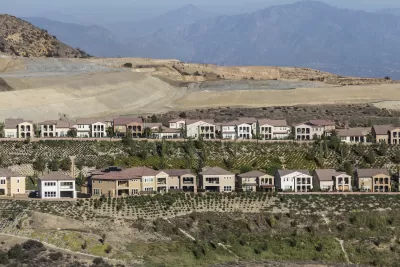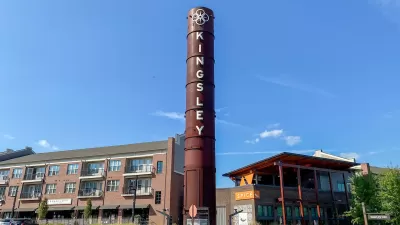While the state continues to rely on driving as a primary means of transportation, fighting climate change and the worsening housing crisis means implementing policies that encourage infill development, higher density, and public transit.

Director of the UCLA Institute of Transportation Studies (ITS) Brian Taylor describes results from ITS research analyzing how transportation and housing policies in California can shift to meet the state's climate goals and encourage more sustainable development. "Policies favoring driving over other means of getting around have for decades received little scrutiny, even as many of our metro areas have grown to where traffic congestion is now endemic. It’s no wonder that the transportation sector accounts for more than 40 percent of all of the state’s greenhouse gas emissions, and cars for about three-quarters of that."
"Building primarily around the car consumes a lot of land, costs a lot of money, and generates a lot of emissions," writes Taylor. "Indeed, our diverse panel of interviewed experts mostly called for metropolitan and transportation planning to become more urban-focused and shift to a less sprawling, car-dependent future."
The study highlighted the need for deprioritizing cars, boosting housing density, and improving public transit options in central cities. "Beyond the state’s urban cores, suburbs will need to fill in rather than spread out further into fire-prone areas."
Taylor notes that "Even in small towns and rural areas, new developments should be constructed to make it easier for people to park once and walk to multiple destinations, rather than driving from parking lot to parking lot in developments strung along roadways."
Taylor acknowledges that "old habits die hard" and changing entrenched patterns of urban development won't happen overnight—but today's policy decisions will drive future results.
FULL STORY: Don’t let the California Dream become a transportation nightmare

Planetizen Federal Action Tracker
A weekly monitor of how Trump’s orders and actions are impacting planners and planning in America.

Maui's Vacation Rental Debate Turns Ugly
Verbal attacks, misinformation campaigns and fistfights plague a high-stakes debate to convert thousands of vacation rentals into long-term housing.

San Francisco Suspends Traffic Calming Amidst Record Deaths
Citing “a challenging fiscal landscape,” the city will cease the program on the heels of 42 traffic deaths, including 24 pedestrians.

Defunct Pittsburgh Power Plant to Become Residential Tower
A decommissioned steam heat plant will be redeveloped into almost 100 affordable housing units.

Trump Prompts Restructuring of Transportation Research Board in “Unprecedented Overreach”
The TRB has eliminated more than half of its committees including those focused on climate, equity, and cities.

Amtrak Rolls Out New Orleans to Alabama “Mardi Gras” Train
The new service will operate morning and evening departures between Mobile and New Orleans.
Urban Design for Planners 1: Software Tools
This six-course series explores essential urban design concepts using open source software and equips planners with the tools they need to participate fully in the urban design process.
Planning for Universal Design
Learn the tools for implementing Universal Design in planning regulations.
Heyer Gruel & Associates PA
JM Goldson LLC
Custer County Colorado
City of Camden Redevelopment Agency
City of Astoria
Transportation Research & Education Center (TREC) at Portland State University
Jefferson Parish Government
Camden Redevelopment Agency
City of Claremont





























